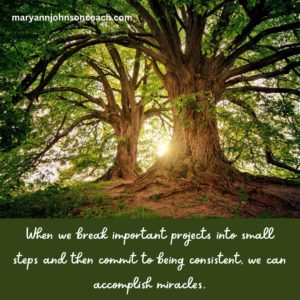 A few Sundays ago, my husband tuned in to a show my mom likes to watch, Music and the Spoken Word. The episode he pulled up for her was from Jan. 12, 2025.
A few Sundays ago, my husband tuned in to a show my mom likes to watch, Music and the Spoken Word. The episode he pulled up for her was from Jan. 12, 2025.
It was an interesting and thought-provoking 30 minutes, and Don and I had a conversation about it. We had experienced what was shared. Our experiences weren’t as dramatic as the one shared in the program, but they were powerful for us, nonetheless.
Lloyd D. Newell, who was the moderator at the time, began by saying, “Every great thing has a beginning. A business begins with an idea. A piece of art develops from a moment of inspiration. A skill set or talent blossoms from a desire to try something new. Anything great or grand first comes from something small and simple.” I knew what he said was true. I’ve heard this in many seminars and classes and have read it in books. Even more than this, I have lived it.
However, I have also experienced that beginning, taking that first step, can be intimidating. The program and my conversation with Don got me thinking about what I have learned and experienced, both successfully and at times, less successfully. Beginning is a practice. Like riding a bike, you must begin, and then keep going, even if you fall a few times.
Start where you are. Use what you have. Do what you can.
Arthur Ashe, the first African American winner of the Men’s US Open Championship, shared his thoughts on how to take that first step, how to begin. He said, “Start where you are. Use what you have. Do what you can.”
It doesn’t seem like that would be enough, but it is. That has been my experience. I have written about the importance and magnificence of small and simple things, done consistently, and the amazing results that come.
Newell shared the story of Sarah Gilbert, whose life exemplified what Arthur Ash shared and what I have lived. Her first step towards a grand goal seemed impossible. In 1851, Sarah wanted to immigrate to America with her family. Her family was large, and their funds were small. There was no way for them to accomplish such a high goal, or so it appeared. Sarah thought about her options, came up with an idea, and then began right where she was, with what she had. She did what she could.
She bought a blind horse and an old wagon. Her husband repaired the wagon and added eight seats to the wagon bed. Each week, Sarah would take paying customers to town to do their shopping. While in town, Sarah would buy simple things she could resell in her small village. Each week, she saved a few pennies. I’m sure when she looked at the jar of savings, it was discouraging, at times. I mean, a few pennies a week. How could this ever get her family to America?
Sarah did eventually get her family to America! It took 27 years. She stuck with her simple system week after week, no matter how discouraging it felt, and, in the end, by small and simple steps, done consistently, she accomplished the impossible. She started where she was. She used what she had, and she did what she could. The result was amazing.
The ideas and dreams we each have require action. We must begin somewhere, even if we aren’t sure how we can make it happen. We must take the first step, where we are, with what we have, and then keep taking steps.
Becoming a successful speaker, teacher, and coach for over a decade began with one small step
When I was five, I decided I wanted to be a speaker. When I was eight, I knew I would write and publish a book. Then I married and raised seven children in Montana. I couldn’t see how any of this could come to pass for me. When I was in my early fifties, we moved to Utah, and I was asked to speak at a homeschool meeting. I didn’t feel competent at that time, even though I had homeschooled my last two children. But I took that step, and ten years later, I was speaking and teaching all over the United States, and I had a published book. All because I was willing to step out and take that first small, scary step.
You Must Start Somewhere
Newell ended the program by sharing this thought – “A simple idea inspires action and action is repeated and improved upon over time, eventually turning into something grand. No great thing can ever be accomplished if you don’t start somewhere.”
This success formula led me to become a speaker and published author. However, even before then, I was using this formula. I wasn’t even aware I was utilizing a success principle. : ) To help raise our seven children in Montana with small means, I taught myself to decorate cakes. I reached out to a woman who was a professional, and she graciously helped me. Then, for over 21 years, I created amazing cakes so my children could have shoes, a new sweater, go on a camping trip, and for one daughter, a trip to Europe in high school. She and I made cakes together and sold them in our neighborhood and church to help fund her trip.
Like Sarah, if you looked at our means, you would have thought it was impossible to do what we did. But we lived the formula, even when we didn’t know we were doing anything important. I began where I was. I had taken a cake class in high school, and that gave me the courage to try. : ) I used what I had, a friend whom I bravely asked for help. I did what I could. I kept learning, practicing, and selling cakes to help care for our family.



 Four years ago, I wrote an article detailing how
Four years ago, I wrote an article detailing how